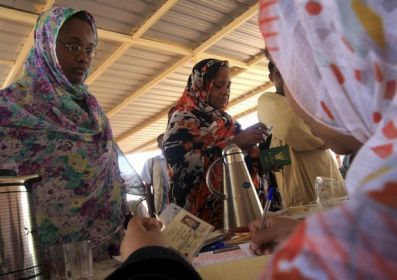Sudan’s elections to be held in April 2010 – Kiir
November 21, 2009 (KHARTOUM) — Sudanese First Vice-President and President of southern Sudan government Salva Kiir Mayardit reaffirmed Saturday that Sudan’s general election would be held in April 2010.

“The elections will be held as scheduled in April next year, but regarding the referendum on self-determination for southern Sudan and its governing law, the matter is still under consultation between the two government partners, the National Congress Party (NCP) and the Sudan People’s Liberation Movement (SPLM),” said Kiir.
The electoral process is facing many difficulties related to the voter registration, the funding of the elections, the difference between the two peace partners over the results of census that are used to determine the electoral constituencies for the legislative elections.
Also donor countries question the significance of such electoral process if the southern Sudan remains resolved to opt for independence less than a year after the onerous and expensive general elections.
Some European countries and USA proposed to hold the election for the Sudanese and southern Sudan government presidencies and to postpone the legislative poll after the outcome of the referendum for southern Sudan.
However delay implies the agreement by the two partners to amend the Comprehensive Peace Agreement which initially conceived the referendum as a mean to reaffirm the adhesion of southerners to the Sudan.
The electoral process is organized by a law passed by the Sudanese parliament last July. The whole country will participate in the election of the President of the Republic; the ten Southern Sudan states will elect the President of Juba semi-autonomous government while every state will elect its Governor.
For the legislative election the law adopted a mixed electoral system. 60 per cent of the 450 MPs will be chosen through the majority elect in their geographical constituencies. It also guarantees 25% of the parliamentary seats to women who will be elected through the proportional representation with other 15% of the MPs.
Last month the opposition parties and the SPLM agreed following a political conference held in Juba to boycott the election if the Sudanese parliament does not pass before November 30, a number of laws aiming at creating an appropriate environment for the multi-party elections.
The declaration spoke precisely about the National Security Law, Criminal Law, Criminal Procedure Law, the Trade Unions Act, the law of immunities, the law of personal status, press and publications law, the laws of public order.
The conference asked to allow the national electoral board to control the media during the election period in order to ensure equal time to all the political forces.
However, the Sudanese parliament went into recess on November 18 till December 7th without adopting the draft laws in a session boycotted by the SPLM while the opposition parties said they would announce their final decision at the end of the month.
Observers agree that the NCP would be opposed to any delay in the electoral process as the opposition forces are not ready due to disorganization and lack of money after long twenty years of rule by the National Congress Party.
During a briefing he made in Paris, Salva Kiir said the two partners would reach an agreement on the referendum issue but did not spoke about the elections.
(ST)
